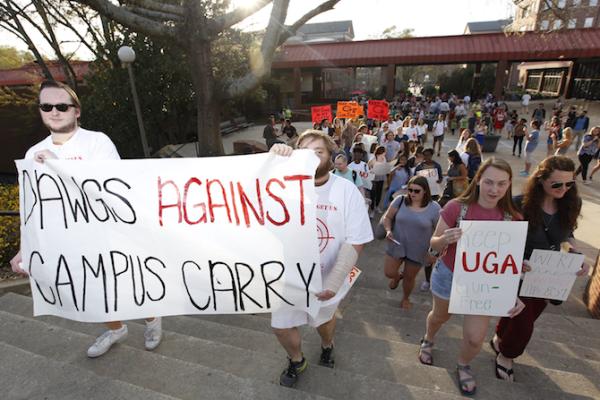Gov. Deal Has Vetoed the Campus Carry Bill

Photo Credit: Joshua L. Jones/file
Expect celebration, if not celebratory gunshots, on the University of Georgia campus this evening: Gov. Nathan Deal has vetoed House Bill 859, the controversial “campus carry” bill.
In a lengthy statement explaining his veto—available in full here—Deal said he believes HB 859 would do little to make campuses safer.
While there have been alarming incidents of criminal conduct on college campuses in which students have been victimized during the past two years, do those acts justify such a radical departure from the classification of colleges as “sensitive areas” where weapons are not allowed? The presumed justification is the need for students to provide their own self protection against such criminal conduct. However, since students who are under 21 years of age would be ineligible to avail themselves of such protection under the terms of HB 859, it is safe to assume that a significant portion of the student body would be unarmed.
As for the buildings and places referred to in this legislation, I will simply call “colleges.” In order to carry a weapon onto a college, there is no requirement that the armed individual actually be a student, only that they possess a license to carry a weapon. Since most, if not all, of our colleges are open campuses, this bill will allow any licensed gun owner to bring a concealed weapon onto the campus and neither police nor other law enforcement personnel will be allowed to even ask the individual to produce evidence of his license.
If the intent of HB 859 is to increase safety of students on college campuses, it is highly questionable that such would be the result. However, I understand the concerns of the authors of this legislation and the parents and students who want it to become law. They apparently believe that the colleges are not providing adequate security on their campuses and that civilian police are not doing so on the sidewalks, streets and parking lots students use as they go to and come from classes.
Along with his veto, Deal issued an executive order to the technical college and university systems directing them to issue reports by Aug. 1 on the security measures in place at each college. He called on leaders of cities like Athens where colleges are located to review their security measures as well.
“Since each of these municipalities and counties receive significant revenue by virtue of the location of these colleges in their jurisdictions, I believe it is appropriate that they be afforded extra protections,” he said.
Deal also recommended that legislators—if they’re concerned about crimes committed with firearms on campuses—stiffen penalties for unauthorized possession of a firearm on campus or the underlying crimes.
HB 859 supporters have said the bill expands Second Amendment rights, but in his statement Deal gave historical precedents for gun-free college campuses.
He cited the late Supreme Court Justice Antonin Scalia’s majority opinion in District of Columbia v. Heller. That case enshrined the right to keep a gun in one’s home, but Scalia wrote that restrictions on guns in “sensitive places such as schools and government buildings” are not unconstitutional.
Deal also noted that Founding Fathers James Madison and Thomas Jefferson banned guns at the University of Virginia, and that Georgia legislators themselves removed the campus-carry provision from a sweeping gun rights expansion in 2014, which Deal signed.
"From the early days of our nation and state, colleges have been treated as sanctuaries of learning where firearms have not been allowed," he said. "To depart from such time honored protections should require overwhelming justification. I do not find that such justification exists."
The bill—which would have allowed permit holders 21 and up to carry guns on college campuses, except in fraternity and sorority houses, dorms and at sporting events—drew widespread opposition among the UGA community.
Back in March, Deal himself also raised concerns about allowing guns among dual-enrolled K-12 students, in professors' offices and daycares and at disciplinary hearings. But Deal didn't express those concerns until after the bill had passed, and legislative leaders refused to pass another bill addressing them.
UGA President Jere Morehead—along with his counterparts at Georgia’s 28 other public colleges and universities—opposed the bill, as did numerous faculty, staff and student groups who believed that students carrying concealed weapons could stifle debate, lead to an increase in suicides, drive off professors and make teachers, classmates and crime victims feel unsafe.
Hundreds of Athens residents called, emailed and tweeted the governor to express their opposition to HB 859, including celebrities like Michael Stipe.












comments